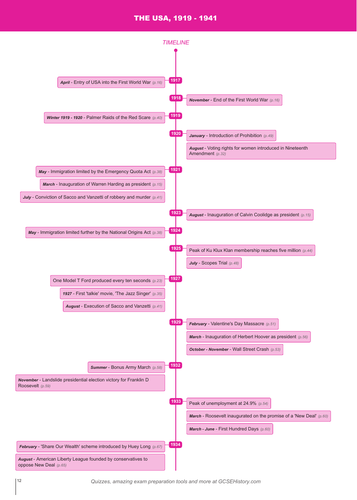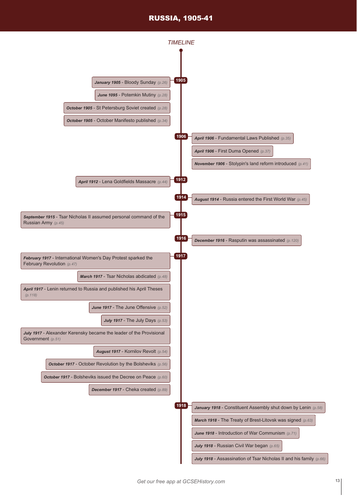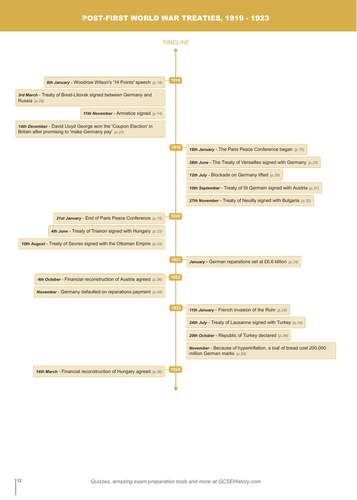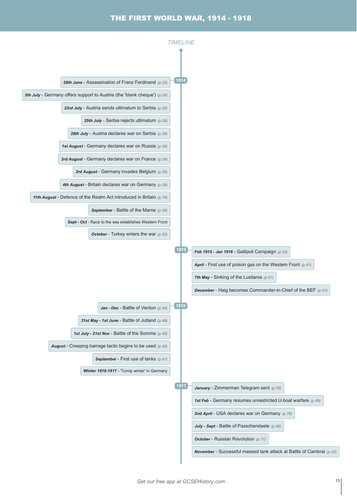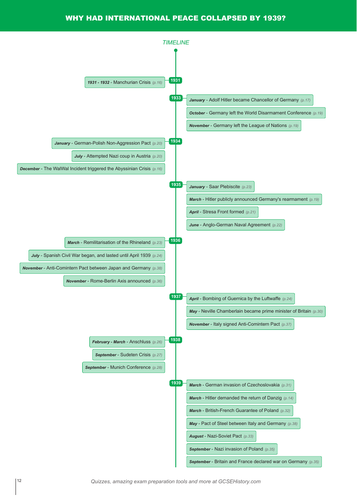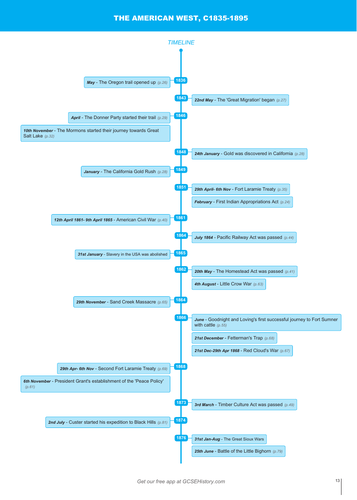112Uploads
39k+Views
16k+Downloads
History

Glossary - AQA Conflict and Tension: The First World War, 1894–1918
This glossary is an extract from from a Study Guide by Clever Lili. [https://www.gcsehistory.com/bookstore/aqa_gcse_conflict_and_tension_1894_to_1918.html]
AQA Conflict and Tension 1894-1914: the First World War is a wider world depth study that investigates international relations. The course focuses on the causes and course of the First World War. It considers how and why the conflict occurred, as well as why it lasted so long.

Glossary - AQA America, 1920–1973: Opportunity and Inequality
This glossary is an extract from from a Study Guide by Clever Lili. [https://www.gcsehistory.com/bookstore/aqa_gcse_america_1920_1973.html]
America 1920-1973: Opportunity and inequality is a period study that focuses on the development of the USA over the course of around fifty years. The course covers the inequality in America, with segregation and poverty, and also the opportunity, with economic success, consumerism and entertainment. You will study the political, economic, social and cultural aspects of America in this period, and the role of key individuals and groups in shaping the USA.

Glossary - AQA Britain: Power and the People, c1170 to the Present Day
This glossary is an extract from from a Study Guide by Clever Lili.[https://www.gcsehistory.com/bookstore/aqa_gcse_power_and_the_people.html]
AQA Power and the people 1170 to the present day is a thematic study. The course focuses on key events in British history and how they have affected the relationship between the government, the monarchy and the citizen. You will study key events, key individuals and the ideas that have contributed to the development of the Britain we know today.

Glossary - AQA Elizabethan England, c1568–1603
This glossary is an extract from from a Study Guide by Clever Lili. [https://www.gcsehistory.com/bookstore/aqa_gcse_elizabeth.html]
AQA Elizabethan England 1586-1603 is split into 4 key enquiries: Elizabeth’s court and Parliament, life in Elizabethan times, roubles abroad and at home, and the historic environment.

Glossary - AQA Conflict and Tension in Asia, 1950-1975
This glossary is an extract from from a Study Guide by Clever Lili. [https://www.gcsehistory.com/bookstore/aqa_gcse_conflict_asia.html]
AQA Conflict and Tension in Asia, 1950 - 1975 is a wider world depth study that investigates international relations. The course focuses on the causes and course of the Cold War in Asia. It considers why conflict occurred in this region, as well as how it developed, and why it proved difficult to find a resolution to the tensions. The course examines the roles of key individuals and groups in influencing change, and how they were impacted by international affairs.

Glossary - AQA America, 1840–1895: Expansion and Consolidation
This glossary is an extract from from a Study Guide by Clever Lili. [https://www.gcsehistory.com/bookstore/aqa_gcse_america_1840_1895.html]
AQA America, 1840–1895: Expansion and Consolidation, is a period study that investigates two aspects of the history of the United States in the second half of the nineteenth century. ‘Expansion’ explores the move westwards by settlers and pioneers, and the ensuing conflicts with Native American peoples. ‘Consolidation’ refers to the forging of the United States as a nation, through its political and economic growth. You will study a range of significant events, people and situations, which shaped the United States throughout this period.

Glossary - CIE International Relations: Who Was to Blame for the Cold War?
This glossary is an extract from from a Study Guide by Clever Lili. [https://www.gcsehistory.com/bookstore/cie_igcse_international_relations_cold_war_causes.html]
The focus question of the fourth unit in the CiE Option B Core Content is ‘Who was to blame for the Cold War?’ This unit investigates the breakdown of the relationship between the USA and USSR after the Second World War, and the impact of events between 1945 and 1949 on the development of the Cold War.

Glossary - AQA Russia, 1894–1945: Tsardom and Communism
This glossary is an extract from from a Study Guide by Clever Lili.[https://www.gcsehistory.com/bookstore/aqa_gcse_russia_tsardom_and_communism_1894_1945.html]
AQA The Russia, 1894-1945: Tsardom and communism course is a period study. The course focuses on key events in the history of Russia during a chaotic half century and the development of communism through the period. You will study key events, key individuals and the social, economic, political and cultural impact of these changes.

Glossary - AQA Conflict and Tension between East and West, 1945–1972
This glossary is an extract from from a Study Guide by Clever Lili. [https://www.gcsehistory.com/bookstore/aqa_gcse_conflict_45_72.html]
AQA Conflict and Tension between East and West 1945-1972 is a wider world depth study that investigates international relations. The course focuses on the causes and course of the Cold War. It considers why the conflict occurred, as well as how it developed into a global conflict over the following quarter of a century.

Glossary - AQA Norman England, c1066–c1100
This glossary is an extract from from a Study Guide by Clever Lili.[https://www.gcsehistory.com/bookstore/aqa_gcse_norman_england.html]
AQA Norman England, 1066-c.1100 is a British depth study that investigates how England changed and developed following the Norman Conquest in 1066. The course focuses on the period from 1066 to the years around the accession of Henry I in 1100. You will focus on crucial events during this period, and study the different social, cultural, political, economic and religious changes that occurred. You will also investigate a specific historical site in detail to examine the relationship between the site and events during this time period.

Glossary - AQA Britain: Migration, Empires and the People, c790 to the Present Day
This glossary is an extract from from a Study Guide by Clever Lili.[https://www.gcsehistory.com/bookstore/aqa_gcse_mep.html]
AQA Migration, empires and the people, c.790 to the present day, is a thematic study. The course focuses on key events in British history and how they have affected Britain’s position in the world, and migration to and from Britain. You will study key events, key individuals, and the ideas that have contributed to the rise and fall of the Britain Empire, and shaped the Britain we know today.

Glossary - Edexcel IGCSE The Vietnam Conflict, 1945–75
This glossary is an extract from from a Study Guide by Clever Lili.[https://www.gcsehistory.com/bookstore/ed_igcse_vietnam.html]
Edexcel IGCSE The Vietnam Conflict 1945 - 75 is a modern investigation and breadth study that details the key events and people involved in the Vietnam Conflict. It covers the military conflict in Vietnam, the involvement of the USA, and the impact of global political conflicts.The course also investigates the French occupation and the impact of the conflict. You will focus on crucial events and study the different social, cultural, political and economic changes that occurred.

Medieval Medicine -AQA, Edexcel
Medicine was slow to advance in medieval times because people didn’t have the knowledge to help them understand the human body. This period was characterised by inaccurate explanations for illness, based on superstition and religion.

Elizabeth I’s problem with religion
Religion was very problematic for Elizabeth as it was very divisive in her subjects’ lives. This is because Protestant ideas ultimately challenged the authority of the Roman Catholic Church. Elizabeth tried to appease everyone by offering a ‘middle way’ compromise.

Timeline - CIE The United States, 1919 - 1941
This timeline is an extract from from a Study Guide by Clever Lili.[https://www.gcsehistory.com/bookstore/cie_igcse_usa_1919_to_1941.html]

Timeline - CIE Russia, 1905 - 1941
This timeline is an extract from from a Study Guide by Clever Lili.[https://www.gcsehistory.com/bookstore/cie_igcse_russia_1905_to_1941.html]

Timeline - CIE International Relations: Were the Peace Treaties of 1919–23 Fair?
This timeline is an extract from from a Study Guide by Clever Lili.[https://www.gcsehistory.com/bookstore/cie_igcse_international_relations_versailles_settlement.html]

Timeline - Cie The First World War, 1914 - 1918
This timeline is an extract from from a Study Guide by Clever Lili.[https://www.gcsehistory.com/bookstore/cie_igcse_ww1.html]

Timeline - CIE International Relations: Why Had International Peace Collapsed by 1939?
This timeline is an extract from from a Study Guide by Clever Lili.[https://www.gcsehistory.com/bookstore/cie_igcse_international_relations_ww2_causes.html]

Timeline - Edexcel GCSE The American West, c1835–c1895
This timeline is an extract from from a Study Guide by Clever Lili.[https://www.gcsehistory.com/bookstore/ed_gcse_america_1835_1895.html]















